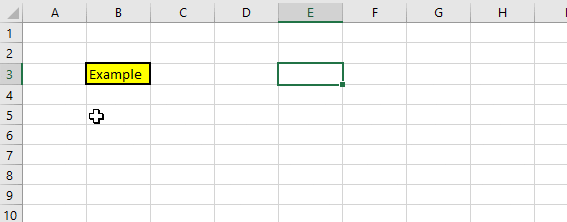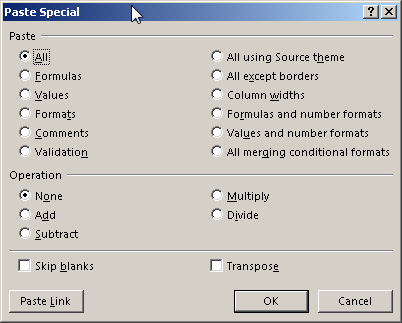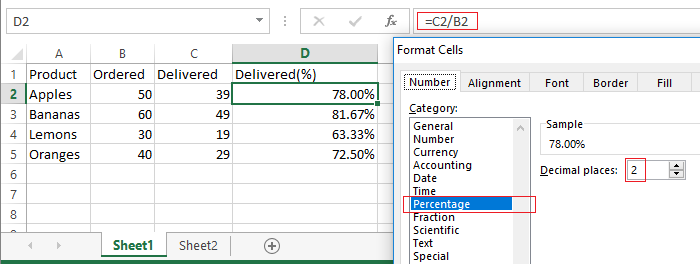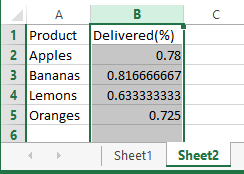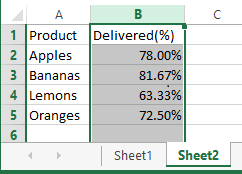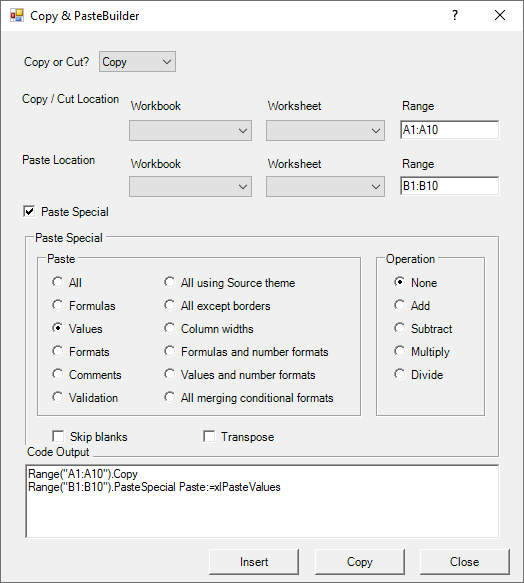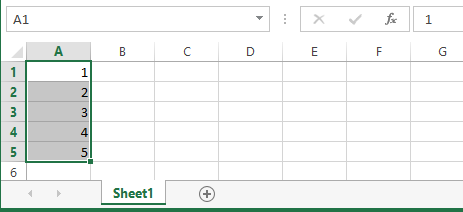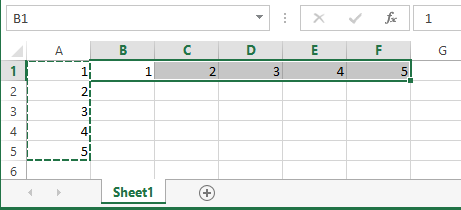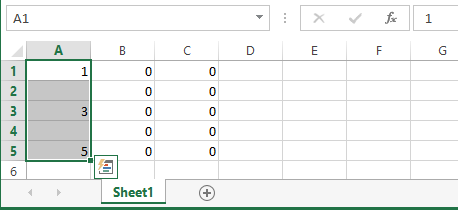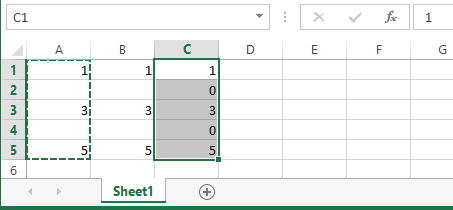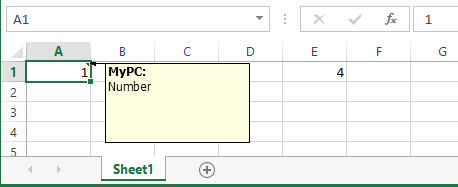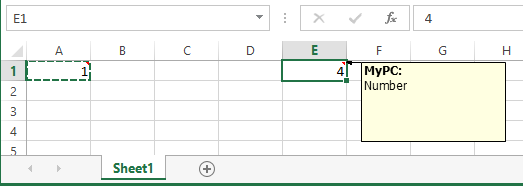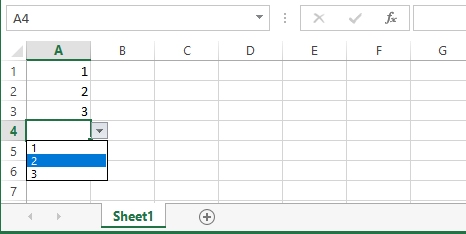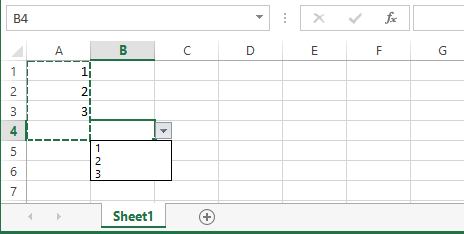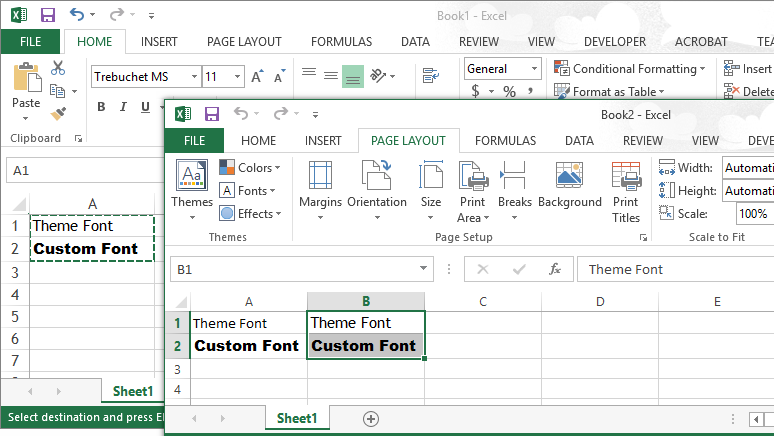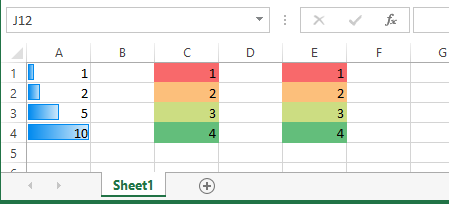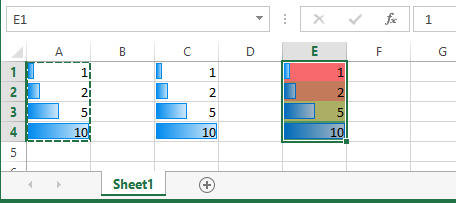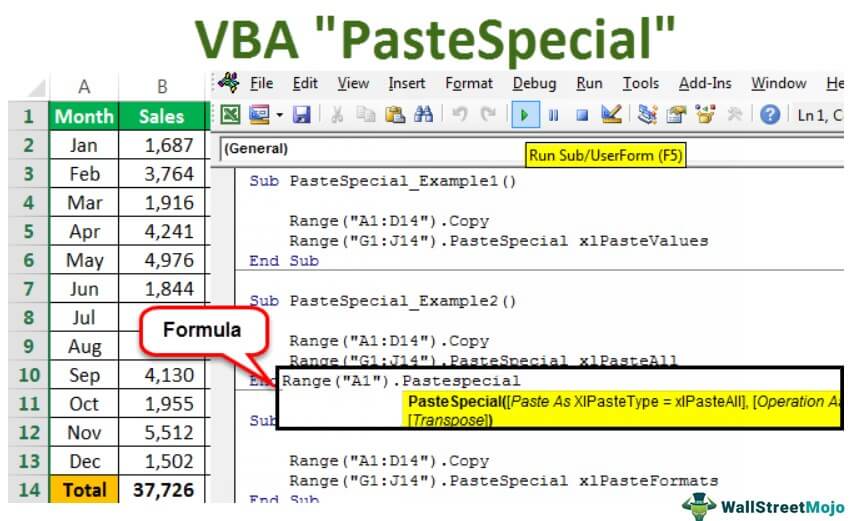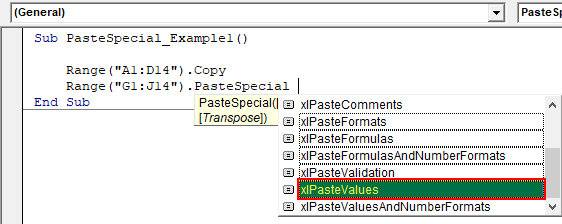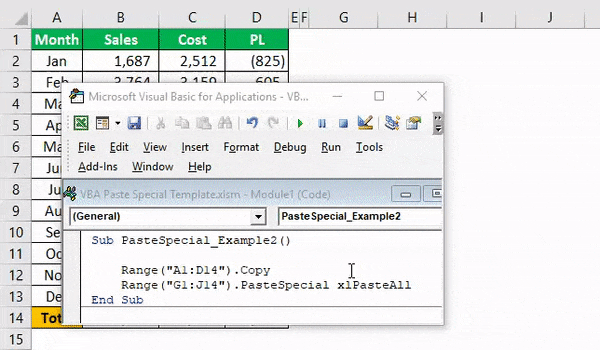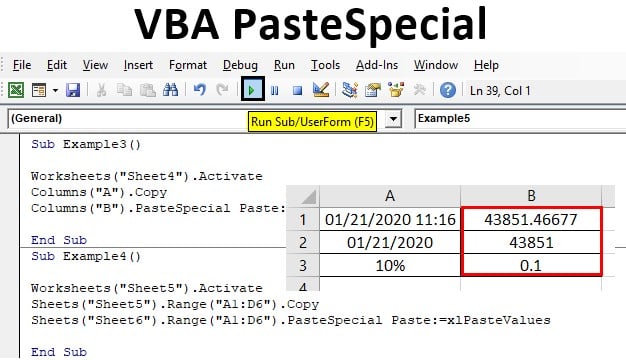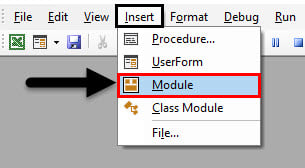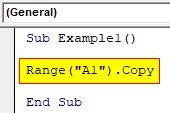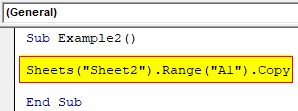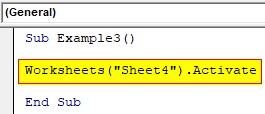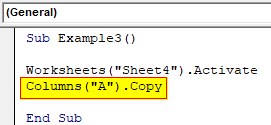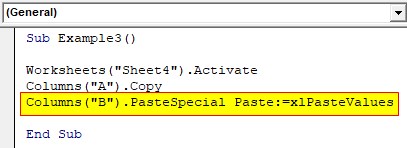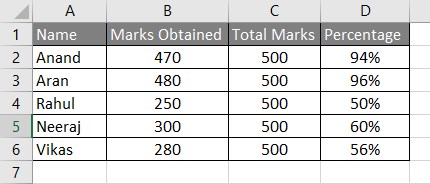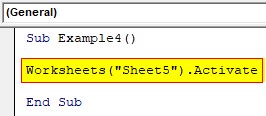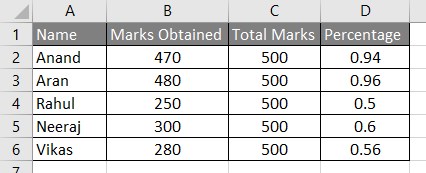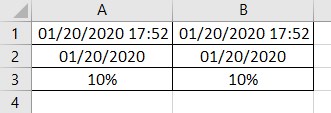Специальная вставка (метод PasteSpecial объекта Range) применяется в VBA Excel для вставки ячеек из буфера обмена с учетом заданных параметров.
Range.PasteSpecial (специальная вставка) – это метод, который вставляет диапазон ячеек, скопированный в буфер обмена, из буфера обмена в указанное место на рабочем листе с учетом заданных параметров специальной вставки.
Синтаксис
|
Range.PasteSpecial (Paste, Operation, SkipBlanks, Transpose) |
Специальная вставка работает только с данными ячеек, скопированными в буфер обмена методом Range.Copy. При попытке применить метод Range.PasteSpecial к ячейкам, вырезанным в буфер обмена методом Range.Cut, возникает ошибка.
Параметры специальной вставки
Список параметров метода Range.PasteSpecial:
| Параметры | Описание |
|---|---|
| Paste | Необязательный параметр. Константа из коллекции XlPasteType, указывающая на часть данных вставляемого диапазона, которую следует вставить. По умолчанию вставляются все данные. |
| Operation | Необязательный параметр. Константа из коллекции XlPasteSpecialOperation, указывающая на математические операции, которые следует провести со скопированными данными и данными в ячейках назначения. По умолчанию вычисления не производятся. |
| SkipBlanks | Необязательный параметр. Булево значение, которое указывает, вставлять ли в конечный диапазон пустые ячейки: True – не вставлять, False – вставлять (значение по умолчанию). |
| Transpose | Необязательный параметр. Булево значение, которое указывает, следует ли транспонировать строки и столбцы при вставке диапазона: True – транспонировать, False – не транспонировать (значение по умолчанию). |
Смотрите другой способ транспонировать диапазоны ячеек и двумерные массивы.
Константы XlPasteType
Список констант из коллекции XlPasteType, которые могут быть использованы в качестве аргумента параметра Paste:
| Константа | Значение | Описание |
|---|---|---|
| xlPasteAll | -4104 | Вставка всех данных (по умолчанию). |
| xlPasteAllExceptBorders | 7 | Вставка всех данных, кроме границ. |
| xlPasteAllMergingConditionalFormats | 14 | Вставка всех данных со слиянием условных форматов исходного и нового диапазонов. |
| xlPasteAllUsingSourceTheme | 13 | Вставка всех данных с использованием исходной темы. |
| xlPasteColumnWidths | 8 | Вставка ширины столбцов. |
| xlPasteComments | -4144 | Вставка комментариев. |
| xlPasteFormats | -4122 | Вставка форматов исходного диапазона. |
| xlPasteFormulas | -4123 | Вставка формул. |
| xlPasteFormulasAndNumberFormats | 11 | Вставка формул и форматов чисел. |
| xlPasteValidation | 6 | Вставка правил проверки данных из ячеек исходного диапазона в новый диапазон. |
| xlPasteValues | -4163 | Вставка значений. |
| xlPasteValuesAndNumberFormats | 12 | Вставка значений и форматов чисел. |
Константы XlPasteSpecialOperation
Список констант из коллекции XlPasteSpecialOperation, которые могут быть использованы в качестве аргумента параметра Operation:
| Константа | Значение | Описание |
|---|---|---|
| xlPasteSpecialOperationAdd | 2 | Скопированные данные будут добавлены к значениям в ячейках назначения. |
| xlPasteSpecialOperationDivide | 5 | Скопированные данные разделят значения в ячейках назначения. |
| xlPasteSpecialOperationMultiply | 4 | Скопированные данные будут перемножены со значениями в ячейках назначения. |
| xlPasteSpecialOperationNone | -4142 | Вычисления не выполняются при вставке данных (по умолчанию). |
| xlPasteSpecialOperationSubtract | 3 | Скопированные данные будут вычтены из значений в ячейках назначения. |
Примеры
Примеры копирования и специальной вставки актуальны для диапазона "A1:B8" активного листа, ячейки которого заполнены числами:
|
‘Копирование диапазона ячеек в буфер обмена: Range(«A1:B8»).Copy ‘Специальная вставка только значений: Range(«D1»).PasteSpecial Paste:=xlPasteValues ‘Специальная вставка с делением значений ячеек конечного ‘диапазона на значения ячеек диапазона из буфера обмена: Range(«D1»).PasteSpecial Operation:=xlPasteSpecialOperationDivide ‘Специальная вставка только значений с транспонированием строк и столбцов: Range(«G1»).PasteSpecial Paste:=xlPasteValues, Transpose:=True |
In this Article
- Paste Values
- Copy and Value Paste to Different Sheet
- Copy and Value Paste Ranges
- Copy and Value Paste Columns
- Copy and Value Paste Rows
- Paste Values and Number Formats
- .Value instead of .Paste
- Cell Value vs. Value2 Property
- Copy Paste Builder
- Paste Special – Formats and Formulas
- Paste Formats
- Paste Formulas
- Paste Formulas and Number Formats
- Paste Special – Transpose and Skip Blanks
- Paste Special – Transpose
- Paste Special – Skip Blanks
- Other Paste Special Options
- Paste Special – Comments
- Paste Special – Validation
- Paste Special – All Using Source Theme
- Paste Special – All Except Borders
- PasteSpecial – Column Widths
- PasteSpecial – All MergingConditionalFormats
This tutorial will show you how to use PasteSpecial in VBA to paste only certain cell properties (exs. values, formats)
In Excel, when you copy and paste a cell you copy and paste all of the cell’s properties: values, formats, formulas, numberformatting, borders, etc:
Instead, you can “Paste Special” to only paste certain cell properties. In Excel, the Paste Special menu can be accessed with the shortcut CTRL + ALT + V (after copying a cell):
Here you can see all the combinations of cell properties that you can paste.
If you record a macro while using the Paste Special Menu, you can simply use the generated code. This is often the easiest way to use VBA to Paste Special.
Paste Values
Paste Values only pastes the cell “value”. If the cell contained a formula, Paste Values will paste the formula result.
This code will Copy & Paste Values for a single cell on the same worksheet:
Range("A1").Copy
Range("B1").PasteSpecial Paste:=xlPasteValuesCopy and Value Paste to Different Sheet
This example will Copy & Paste Values for single cells on different worksheets
Sheets("Sheet1").Range("A1").Copy
Sheets("Sheet2").Range("B1").PasteSpecial Paste:=xlPasteValuesThese examples will Copy & Paste Values for a ranges of cells:
Copy and Value Paste Ranges
Range("A1:B3").Copy
Range("C1").PasteSpecial Paste:=xlPasteValues
Copy and Value Paste Columns
Columns("A").Copy
Columns("B").PasteSpecial Paste:=xlPasteValuesCopy and Value Paste Rows
Rows(1).Copy
Rows(2).PasteSpecial Paste:=xlPasteValuesPaste Values and Number Formats
Pasting Values will only paste the cell value. No Formatting is pasted, including Number Formatting.
Often when you Paste Values you will probably want to include the number formatting as well so your values remain formatted. Let’s look at an example.
Here we will value paste a cell containing a percentage:
Sheets("Sheet1").Columns("D").Copy
Sheets("Sheet2").Columns("B").PasteSpecial Paste:=xlPasteValuesNotice how the percentage number formatting is lost and instead a sloppy decimal value is shown.
Instead let’s use Paste Values and Numbers formats:
Sheets("Sheet1").Columns("D").Copy
Sheets("Sheet2").Columns("B").PasteSpecial Paste:=xlPasteValuesAndNumberFormatsNow you can see the number formatting is also pasted over, maintaining the percentage format.
VBA Coding Made Easy
Stop searching for VBA code online. Learn more about AutoMacro — A VBA Code Builder that allows beginners to code procedures from scratch with minimal coding knowledge and with many time-saving features for all users!
Learn More
.Value instead of .Paste
Instead of Pasting Values, you could use the Value property of the Range object:
This will set A2’s cell value equal to B2’s cell value
Range("A2").Value = Range("B2").ValueYou can also set a range of cells equal to a single cell’s value:
Range("A2:C5").Value = Range("A1").Valueor a range of cells equal to another identically sized range of cells:
Range("B2:D4").Value = Range("A1:C3").ValueIt’s less typing to use the Value property. Also, if you want to become proficient with Excel VBA, you should be familiar with working with the Value property of cells.
Cell Value vs. Value2 Property
Technically, it’s better to use the Value2 property of a cell. Value2 is slightly faster (this only matters with extremely large calculations) and the Value property might give you a truncated result of the cell is formatted as currency or a date. However, 99%+ of code that I’ve seen uses .Value and not .Value2. I personally do not use .Value2, but you should be aware that it exists.
Range("A2").Value2 = Range("B2").Value2Copy Paste Builder
We’ve created a “Copy Paste Code Builder” that makes it easy to generate VBA code to copy (or cut) and paste cells. The builder is part of our VBA Add-in: AutoMacro.
AutoMacro also contains many other Code Generators, an extensive Code Library, and powerful Coding Tools.
VBA Programming | Code Generator does work for you!
Paste Special – Formats and Formulas
Besides Paste Values, the most common Paste Special options are Paste Formats and Paste Formulas
Paste Formats
Paste formats allows you to paste all cell formatting.
Range("A1:A10").Copy
Range("B1:B10").PasteSpecial Paste:=xlPasteFormatsPaste Formulas
Paste formulas will paste only the cell formulas. This is also extremely useful if you want to copy cell formulas, but don’t want to copy cell background colors (or other cell formatting).
Range("A1:A10").Copy
Range("B1:B10").PasteSpecial Paste:=xlPasteFormulasPaste Formulas and Number Formats
Similar to Paste Values and Number Formats above, you can also copy and paste number formats along with formulas
Here we will copy a cell formula with Accounting Number Formatting and Paste Formulas only.
Sheets("Sheet1").Range("D3").Copy
Sheets("Sheet2").Range("D3").PasteSpecial xlPasteFormulasNotice how the number formatting is lost and instead a sloppy non-rounded value is shown instead.
Instead let’s use Paste Formulas and Numbers formats:
Sheets("Sheet1").Range("D3").Copy
Sheets("Sheet2").Range("D3").PasteSpecial xlPasteFormulasAndNumberFormatsNow you can see the number formatting is also pasted over, maintaining the Accounting format.
Paste Special – Transpose and Skip Blanks
AutoMacro | Ultimate VBA Add-in | Click for Free Trial!
Paste Special – Transpose
Paste Special Transpose allows you to copy and paste cells changing the orientation from top-bottom to left-right (or vis-a-versa):
Sheets("Sheet1").Range("A1:A5").Copy
Sheets("Sheet1").Range("B1").PasteSpecial Transpose:=TruePaste Special – Skip Blanks
Skip blanks is a paste special option that doesn’t seem to be used as often as it should be. It allows you to copy only non-blank cells when copying and pasting. So blank cells are not copied.
In this example below. We will copy column A, do a regular paste in column B and skip blanks paste in column C. You can see the blank cells were not pasted into column C in the image below.
Sheets("Sheet1").Range("A1:A5").Copy
Sheets("Sheet1").Range("B1").PasteSpecial SkipBlanks:=False
Sheets("Sheet1").Range("C1").PasteSpecial SkipBlanks:=TrueOther Paste Special Options
Sheets("Sheet1").Range("A1").Copy Sheets("Sheet1").Range("E1").PasteSpecial xlPasteCommentsAutoMacro | Ultimate VBA Add-in | Click for Free Trial!
Paste Special – Validation
Sheets("Sheet1").Range("A1:A4").Copy
Sheets("Sheet1").Range("B1:B4").PasteSpecial xlPasteValidationPaste Special – All Using Source Theme
Workbooks(1).Sheets("Sheet1").Range("A1:A2").Copy
Workbooks(2).Sheets("Sheet1").Range("A1").PasteSpecial
Workbooks(2).Sheets("Sheet1").Range("B1").PasteSpecial xlPasteAllUsingSourceThemePaste Special – All Except Borders
Range("B2:C3").Copy
Range("E2").PasteSpecial
Range("H2").PasteSpecial xlPasteAllExceptBordersPasteSpecial – Column Widths
A personal favorite of mine. PasteSpecial Column Widths will copy and paste the width of columns.
Range("A1:A2").Copy
Range("C1").PasteSpecial
Range("E1").PasteSpecial xlPasteColumnWidthsPasteSpecial – All MergingConditionalFormats
Range("A1:A4").Copy
Range("C1").PasteSpecial
Range("E1").PasteSpecial xlPasteAllMergingConditionalFormatsLike a worksheet, we have a Paste Special method to copy data and paste it on a different cell range. It allows us to paste the data as itself or only the formulas or only the values and the same fashion. We can use Paste Special in VBA using the range property method: paste special() providing the type we want in the brackets.
Paste Special in excelPaste special in Excel allows you to paste partial aspects of the data copied. There are several ways to paste special in Excel, including right-clicking on the target cell and selecting paste special, or using a shortcut such as CTRL+ALT+V or ALT+E+S.read more serves in many ways in our daily work. Using Paste Special, we can do many more things than usual. Of course, copy and paste are everywhere in the computer world. But, Paste Special is the advanced thing in Excel.
Like regular Excel Paste Special in VBA, too, we have a Paste Special method to paste the copied data. Copying things in Excel is not strange for Excel users. They copy and paste, and most of the time, they use Paste Special to serve their purpose in many ways.
You are free to use this image on your website, templates, etc, Please provide us with an attribution linkArticle Link to be Hyperlinked
For eg:
Source: VBA Paste Special (wallstreetmojo.com)
In regular Excel, paste includes many options like paste only values, paste formulas, paste formats, etc.
Paste Special has to paste, operate, skip blanks, and transpose like in VBA. So, we have all the parameters with the Paste Special method.
Table of contents
- Paste Special in VBA
- The Formula of Paste Special in VBA
- Examples of Paste Special in Excel VBA
- Example #1 – Paste only Values using VBA PasteSpecial Function
- Example #2 – Paste All using VBA PasteSpecial
- Example #3 – Paste Formats using VBA PasteSpecial Function
- Example #4 – Paste Column Width using VBA Paste Special
- Example #5 – Copy the Data from One Sheet to Another Sheet using VBA Paste Special Option
- Things to Remember About Excel VBA PasteSpecial Function
- Recommended Articles
The Formula of Paste Special in VBA
Below is the formula for Paste Special in VBA.
The Paste Special is available with the VBA Range objectRange is a property in VBA that helps specify a particular cell, a range of cells, a row, a column, or a three-dimensional range. In the context of the Excel worksheet, the VBA range object includes a single cell or multiple cells spread across various rows and columns.read more because after copying the data, we will be pasting it in the cell range, so the Paste Special method is available with the Range object.
Paste Type: After copying the data, how do you want to paste it? Whether you want to paste values, formulas, formats, validation, etc. Below is the complete list of options available under Paste Type.
Paste Special Operation: While pasting, do you want to perform any operations like add, subtract, division, multiplication, or none?
- [Skip Blanks]: If you want to skip blanks, you can choose TRUE or FALSE.
- [Transpose]: If you want to transpose the data, you can choose TRUE or FALSE.
Examples of Paste Special in Excel VBA
The following are examples of Paste Special in VBA.
You can download this VBA Paste Special Template here – VBA Paste Special Template
Example #1 – Paste only Values using VBA PasteSpecial Function
In the first example, we will perform pasting only values using paste special. For example, assume below is the data you have in the sheet name called “Sales Data.”
Now, we will perform the task of copying and pasting using several Paste Special methods. Follow the below steps.
Step 1: Create a Macro name first.
Step 2: First, copy the range A1 to D14 from the sheet name “Sales Data.” To copy the range, apply the below code.
Code:
Range("A1:D14").Copy
Step 3: After copying the data, we will paste the values from G1 to J14. First, reference the range.
Code:
Range ("G1:J14")
Step 4: After selecting the range, we need to paste. So, put a dot (.) and select the Paste Special method.
Code:
Sub PasteSpecial_Example1() Range("A1:D14").Copy Range("G1:J14").PasteSpecial End Sub
Step 5: From the dropdown list, select the option “xlPasteValues.”
Code:
Sub PasteSpecial_Example1() Range("A1:D14").Copy Range("G1:J14").PasteSpecial xlPasteValues End Sub
Step 6: Run this code using the F5 key or manually and see what happens.
So, our code copied the data from A1 to D14 and pasted it from G1 to J14 as values.
It has performed the task of shortcut excel keyAn Excel shortcut is a technique of performing a manual task in a quicker way.read more in worksheet ALT + E + S + V.
Example #2 – Paste All using VBA PasteSpecial
Now, we will see what happens if we perform the task of xlPasteAll.
Code:
Sub PasteSpecial_Example2() Range("A1:D14").Copy Range("G1:J14").PasteSpecial xlPasteAll End Sub
Now, if you run this code manually through the “Run” option, by pressing the F5 key, we will have as it is data.
Example #3 – Paste Formats using VBA PasteSpecial Function
Now, we will see how to paste only formats. The below code would do the job for us.
Code:
Sub PasteSpecial_Example3() Range("A1:D14").Copy Range("G1:J14").PasteSpecial xlPasteFormats End Sub
If you run this code using the F5 key or manually, we will get the only format of the copied range, nothing else.
Example #4 – Paste Column Width using VBA Paste Special
Now, we will see how to paste only column widthA user can set the width of a column in an excel worksheet between 0 and 255, where one character width equals one unit. The column width for a new excel sheet is 8.43 characters, which is equal to 64 pixels.read more from the copied range. For this, we have increased the width of one of my data columns.
Apply the below code. It will paste only the column width of the copied range.
Code:
Sub PasteSpecial_Example3() Range("A1:D14").Copy Range("G1:J14").PasteSpecial xlPasteColumnWidths End Sub
Run this code and see the difference in the column width.
Now, the “Sales” column width increases to the width of our copied range column.
Example #5 – Copy the Data from One Sheet to Another Sheet using VBA Paste Special Option
We have seen how to copy and paste the data on the same sheet. Now, we will learn how to paste from one sheet to another sheet.
Step 1: Before we select the range, we need to tell from which sheet we need to select the data.
Code:
Sub PasteSpecial_Example5() Worksheets ("Sales Data") End Sub
Step 2: After selecting the sheet by its name, we need to select the range in that sheet. They copy it.
Code:
Sub PasteSpecial_Example5() Worksheets("Sales Data").Range("A1:D14").Copy End Sub
The above code says in the sheet name “Sales Data” copy the Range (“A1:D14”).
Step 3: Since we are pasting it on a different sheet, we must select the sheet by its name.
Code:
Sub PasteSpecial_Example5() Worksheets("Sales Data").Range("A1:D14").Copy Worksheets ("Month Sheet") End Sub
Step 4: Now, in the sheet “Month Sheet,” select the range.
Code:
Sub PasteSpecial_Example5() Worksheets("Sales Data").Range("A1:D14").Copy Worksheets("Month Sheet").Range ("A1:D14") End Sub
Step 5: Using Paste Special, we will be pasting values and format.
Code:
Sub PasteSpecial_Example5() Worksheets("Sales Data").Range("A1:D14").Copy Worksheets("Month Sheet").Range("A1:D14").PasteSpecial xlPasteValuesAndNumberFormats End Sub
Step 6: We are not only pasting values and format using VBA Paste Special, but we are pasting it as TRANSPOSE as well.
Code:
Sub PasteSpecial_Example5() Worksheets("Sales Data").Range("A1:D14").Copy Worksheets("Month Sheet").Range("A1:D14").PasteSpecial xlPasteValuesAndNumberFormats, Transpose:=True End Sub
Now run this code. It will copy and transpose the data to the “Month Sheet.”
Things to Remember About Excel VBA PasteSpecial Function
- To skip blanks, we must enter the argument as TRUE by default. It takes FALSE.
- If we want to transpose the data, we must select the transpose as TRUE.
- We can perform only one Paste Special at a time.
Recommended Articles
This article has been a guide to Excel VBA PasteSpecial. Here, we learn the top 5 ways to use VBA PasteSpecial function, practical examples, and downloadable VBA codes. Below are some useful Excel articles related to VBA: –
- Record VBA MacrosVBA Macros are the lines of code that instruct the excel to do specific tasks, i.e., once the code is written in Visual Basic Editor (VBE), the user can quickly execute the same task at any time in the workbook. It thus eliminates the repetitive, monotonous tasks and automates the process.read more
- VBA PasteThere are three different ways to paste some data from place to another in a worksheet using VBA, the first method is to normally refer the values from one cell to another cell using the assignment operator, another method is by using the paste function and third method is by using the pastespecial function.read more
- VBA Code in Excel FunctionVBA code refers to a set of instructions written by the user in the Visual Basic Applications programming language on a Visual Basic Editor (VBE) to perform a specific task.read more
- How to Transpose in VBA?Transpose function flips rows and columns in a data table, turning rows into columns and columns into rows.read more
Содержание
- Selection.PasteSpecial method (Word)
- Syntax
- Parameters
- Remarks
- Example
- See also
- Support and feedback
- VBA Excel. Метод Range.PasteSpecial (специальная вставка)
- Метод Range.PasteSpecial
- Синтаксис
- Параметры специальной вставки
- Константы XlPasteType
- Константы XlPasteSpecialOperation
- Примеры
- Selection.PasteSpecial method (Word)
- Синтаксис
- Параметры
- Замечания
- Пример
- См. также
- Поддержка и обратная связь
- Метод Worksheet.PasteSpecial (Excel)
- Синтаксис
- Параметры
- Замечания
- Пример
- Поддержка и обратная связь
Selection.PasteSpecial method (Word)
Inserts the contents of the Clipboard.
Syntax
expression.PasteSpecial (IconIndex, Link, Placement, DisplayAsIcon, DataType, IconFileName, IconLabel)
expression Required. A variable that represents a Selection object.
Parameters
| Name | Required/Optional | Data type | Description |
|---|---|---|---|
| IconIndex | Optional | Variant | If DisplayAsIcon is True, this argument is a number that corresponds to the icon you want to use in the program file specified by IconFilename. If this argument is omitted, this method uses the first (default) icon. |
| Link | Optional | Variant | True to create a link to the source file of the Clipboard contents. The default value is False. |
| Placement | Optional | Variant | Can be either of the WdOLEPlacement constants. |
| DisplayAsIcon | Optional | Variant | True to display the link as an icon. The default value is False. |
| DataType | Optional | Variant | A format for the Clipboard contents when they are inserted into the document. WdPasteDataType. |
| IconFileName | Optional | Variant | If DisplayAsIcon is True, this argument is the path and file name for the file in which the icon to be displayed is stored. |
| IconLabel | Optional | Variant | If DisplayAsIcon is True, this argument is the text that appears below the icon. |
Unlike with the Paste method, with PasteSpecial you can control the format of the pasted information and (optionally) establish a link to the source file (for example, a Microsoft Excel worksheet). If you don’t want to replace the contents of the specified selection, use the Collapse method before you use this method. When you use this method, the selection does not expand to include the contents of the Clipboard.
Example
This example inserts the Clipboard contents at the insertion point as unformatted text.
See also
Support and feedback
Have questions or feedback about Office VBA or this documentation? Please see Office VBA support and feedback for guidance about the ways you can receive support and provide feedback.
Источник
VBA Excel. Метод Range.PasteSpecial (специальная вставка)
Специальная вставка (метод PasteSpecial объекта Range) применяется в VBA Excel для вставки ячеек из буфера обмена с учетом заданных параметров.
Метод Range.PasteSpecial
Синтаксис
Специальная вставка работает только с данными ячеек, скопированными в буфер обмена методом Range.Copy. При попытке применить метод Range.PasteSpecial к ячейкам, вырезанным в буфер обмена методом Range.Cut, возникает ошибка.
Параметры специальной вставки
Список параметров метода Range.PasteSpecial:
| Параметры | Описание |
|---|---|
| Paste | Необязательный параметр. Константа из коллекции XlPasteType, указывающая на часть данных вставляемого диапазона, которую следует вставить. По умолчанию вставляются все данные. |
| Operation | Необязательный параметр. Константа из коллекции XlPasteSpecialOperation, указывающая на математические операции, которые следует провести со скопированными данными и данными в ячейках назначения. По умолчанию вычисления не производятся. |
| SkipBlanks | Необязательный параметр. Булево значение, которое указывает, вставлять ли в конечный диапазон пустые ячейки: True – не вставлять, False – вставлять (значение по умолчанию). |
| Transpose | Необязательный параметр. Булево значение, которое указывает, следует ли транспонировать строки и столбцы при вставке диапазона: True – транспонировать, False – не транспонировать (значение по умолчанию). |
Смотрите другой способ транспонировать диапазоны ячеек и двумерные массивы.
Константы XlPasteType
Список констант из коллекции XlPasteType, которые могут быть использованы в качестве аргумента параметра Paste:
| Константа | Значение | Описание |
|---|---|---|
| xlPasteAll | -4104 | Вставка всех данных (по умолчанию). |
| xlPasteAllExceptBorders | 7 | Вставка всех данных, кроме границ. |
| xlPasteAllMergingConditionalFormats | 14 | Вставка всех данных со слиянием условных форматов исходного и нового диапазонов. |
| xlPasteAllUsingSourceTheme | 13 | Вставка всех данных с использованием исходной темы. |
| xlPasteColumnWidths | 8 | Вставка ширины столбцов. |
| xlPasteComments | -4144 | Вставка комментариев. |
| xlPasteFormats | -4122 | Вставка форматов исходного диапазона. |
| xlPasteFormulas | -4123 | Вставка формул. |
| xlPasteFormulasAndNumberFormats | 11 | Вставка формул и форматов чисел. |
| xlPasteValidation | 6 | Вставка правил проверки данных из ячеек исходного диапазона в новый диапазон. |
| xlPasteValues | -4163 | Вставка значений. |
| xlPasteValuesAndNumberFormats | 12 | Вставка значений и форматов чисел. |
Константы XlPasteSpecialOperation
Список констант из коллекции XlPasteSpecialOperation, которые могут быть использованы в качестве аргумента параметра Operation:
| Константа | Значение | Описание |
|---|---|---|
| xlPasteSpecialOperationAdd | 2 | Скопированные данные будут добавлены к значениям в ячейках назначения. |
| xlPasteSpecialOperationDivide | 5 | Скопированные данные разделят значения в ячейках назначения. |
| xlPasteSpecialOperationMultiply | 4 | Скопированные данные будут перемножены со значениями в ячейках назначения. |
| xlPasteSpecialOperationNone | -4142 | Вычисления не выполняются при вставке данных (по умолчанию). |
| xlPasteSpecialOperationSubtract | 3 | Скопированные данные будут вычтены из значений в ячейках назначения. |
Примеры
Примеры копирования и специальной вставки актуальны для диапазона «A1:B8» активного листа, ячейки которого заполнены числами:
Источник
Selection.PasteSpecial method (Word)
Вставляет содержимое буфера обмена.
Синтаксис
expression. PasteSpecial (IconIndex, Link, Placement, DisplayAsIcon, DataType, IconFileName, IconLabel)
выражение (обязательно). Переменная, представляющая объект Selection .
Параметры
| Имя | Обязательный или необязательный | Тип данных | Описание |
|---|---|---|---|
| IconIndex | Необязательный | Variant | Если параметр DisplayAsIcon имеет значение True, этот аргумент представляет собой число, соответствующее значку, который вы хотите использовать в файле программы, заданном параметром IconFilename. Если этот аргумент опущен, этот метод использует первый значок (по умолчанию). |
| Link | Необязательный | Variant | Значение true , чтобы создать ссылку на исходный файл содержимого буфера обмена. Значение по умолчанию — False. |
| Placement | Необязательный | Variant | Может быть любой из констант WdOLEPlacement . |
| DisplayAsIcon | Необязательный | Variant | Значение true , чтобы отобразить ссылку в виде значка. Значение по умолчанию — False. |
| DataType | Необязательный | Variant | Формат для содержимого буфера обмена при его вставке в документ. WdPasteDataType. |
| IconFileName | Необязательный | Variant | Если параметр DisplayAsIcon имеет значение True, этот аргумент является путем и именем файла, в котором хранится отображаемый значок. |
| IconLabel | Необязательный | Variant | Если параметр DisplayAsIcon имеет значение True, этот аргумент представляет собой текст, который отображается под значком. |
Замечания
В отличие от метода Paste , с помощью PasteSpecial можно управлять форматом вставленной информации и (при необходимости) установить ссылку на исходный файл (например, лист Microsoft Excel). Если вы не хотите заменять содержимое указанного выделенного фрагмента, перед использованием этого метода используйте метод Collapse . При использовании этого метода выделение не расширяется, чтобы включить содержимое буфера обмена.
Пример
В этом примере содержимое буфера обмена вставляется в точку вставки как неформатированный текст.
См. также
Поддержка и обратная связь
Есть вопросы или отзывы, касающиеся Office VBA или этой статьи? Руководство по другим способам получения поддержки и отправки отзывов см. в статье Поддержка Office VBA и обратная связь.
Источник
Метод Worksheet.PasteSpecial (Excel)
Вставляет содержимое буфера обмена на лист в указанном формате. Используйте этот метод для вставки данных из других приложений или для вставки данных в определенном формате.
Синтаксис
expression. PasteSpecial (Format, Link, DisplayAsIcon, IconFileName, IconIndex, IconLabel, NoHTMLFormatting)
Выражение Переменная, представляющая объект Worksheet .
Параметры
| Имя | Обязательный или необязательный | Тип данных | Описание |
|---|---|---|---|
| Format | Необязательный | Variant | Строка, указывающая формат буфера обмена данных. |
| Link | Необязательный | Variant | Значение true , чтобы установить связь с источником вставленных данных. Если исходные данные не подходят для связывания или исходное приложение не поддерживает связывание, этот параметр игнорируется. Значение по умолчанию — False. |
| DisplayAsIcon | Необязательный | Variant | Значение true для отображения вставленных данных в виде значка. Значение по умолчанию — False. |
| IconFileName | Необязательный | Variant | Имя файла, содержащего значок для использования, если DisplayAsIcon имеет значение True. |
| IconIndex | Необязательный | Variant | Номер индекса значка в файле значка. |
| IconLabel | Необязательный | Variant | Текстовая метка значка. |
| NoHTMLFormatting | Необязательный | Variant | Значение true , чтобы удалить все форматирование, гиперссылки и изображения из HTML. Значение False для вставки HTML как есть. Значение по умолчанию — False. |
Замечания
Значение NoHTMLFormatting имеет значение только в том случае, если Format = «HTML»; Во всех остальных случаях параметр NoHTMLFormatting игнорируется.
Перед использованием этого метода необходимо выбрать диапазон назначения.
Этот метод может изменить выбранный лист в зависимости от содержимого буфера обмена.
Для разработчиков языков, отличных от английского, можно заменить одну из следующих констант (0–5), чтобы она соответствовала строковой эквивалентной формату файла рисунка.
| Аргумент Format | Эквивалент строки |
|---|---|
| 0 | «Рисунок (PNG)» |
| 1 | «Рисунок (JPEG)» |
| 2 | «Рисунок (GIF)» |
| 3 | «Изображение (расширенный метафайл)» |
| 4 | «Растровое изображение» |
| 5 | «Объект документа Microsoft Office» |
Пример
В этом примере объект документа Microsoft Word вставляется из буфера обмена в ячейку D1 на Листе1.
В этом примере объект рисунка вставляется и не отображается в виде значка.
Поддержка и обратная связь
Есть вопросы или отзывы, касающиеся Office VBA или этой статьи? Руководство по другим способам получения поддержки и отправки отзывов см. в статье Поддержка Office VBA и обратная связь.
Источник
PasteSpecial in VBA
In this article, we will see an outline on VBA PasteSpecial. When we work with data in excel some data are obtained by formulas. These formulas are from references and when we paste this data to another sheet or any other workbook what happens? Because the formula is a reference and the new sheet doesn’t have the reference for the formula the value pasted is shown as an error. So in these situations what we do is paste the values as special values and what it does is that it does not paste the formulas in the target worksheet rather than pasting the value generated by the formula in the target worksheet. Similarly, in VBA there is a method to paste the values which are known as Paste Special Method. We will learn in this article how to paste as values for a single cell to the entire column and then to paste in another worksheet also we will learn the difference of (.Value) and (.Paste)method.
How to Use the PasteSpecial Method in Excel VBA?
The following examples will teach us how to use the PasteSpecial method in Excel by using the VBA Code.
You can download this VBA PasteSpecial Excel Template here – VBA PasteSpecial Excel Template
Example #1 – VBA PasteSpecial
Let us begin with the basic step in this example when we paste special for a single cell in VBA. For this, follow the below steps:
Step 1: Insert a new module inside Visual Basic Editor (VBE). Click on Insert tab > select Module.
Step 2: In the module start a subprocedure.
Code:
Sub Example1() End Sub
Step 3: Let us copy the value we have in cell A1 using the range property method.
Code:
Sub Example1() Range("A1").Copy End Sub
Step 4: Now let us use the paste special method to paste value we copied in cell B1.
Code:
Sub Example1() Range("A1").Copy Range("B1").PasteSpecial Paste:=xlPasteValues End Sub
Step 5: When we execute the above code we can see the result in the cell B1.
Example #2 – VBA PasteSpecial
In the previous example, we copied value from a cell and paste it to an adjacent cell. Now let us copy a value from a range and paste it to another sheet. In this example, we have a value in cell A1 which is in sheet 2 and we want to paste it in sheet 2 to cell B1. For this, follow the below steps:
Step 1: We will work in the same module we had inserted as Module1 and start our subprocedure as Example 2.
Code:
Sub Example2() End Sub
Step 2: Now let us copy the value from sheet 2 and cell A1 by using the paste method.
Code:
Sub Example2() Sheets("Sheet2").Range("A1").Copy End Sub
Step 3: The next step is to paste the values in sheet 3 using the paste special method in the cell B1.
Code:
Sub Example2() Sheets("Sheet2").Range("A1").Copy Sheets("Sheet3").Range("B1").PasteSpecial Paste:=xlPasteValues End Sub
Step 4: Before we run the above procedure let us check what we have as Value in Cell A1 for sheet 2
Step 5: Now run the code and see the result in sheet 3.
Example #3 – VBA PasteSpecial
Earlier we copied a cell from one cell to another and from one worksheet to another. In this example, we will copy an entire column and paste it to another column. For this, follow the below steps:
Step 1: The defining of the subprocedure will be the same as for all the codes above, let us begin right below the example 3 in the same module.
Code:
Sub Example3() End Sub
Step 2: Since we are working in sheet 4 now so it is necessary to activate sheet 4 before we make any changes to avoid confusion and error.
Code:
Sub Example3() Worksheets("Sheet4").Activate End Sub
Step 3: Now we will copy the values in column A using the copy method.
Code:
Sub Example3() Worksheets("Sheet4").Activate Columns("A").Copy End Sub
Step 4: And we will paste the copied column to column B using the paste special method.
Code:
Sub Example3() Worksheets("Sheet4").Activate Columns("A").Copy Columns("B").PasteSpecial Paste:=xlPasteValues End Sub
Step 5: Run this code by hitting F5 or the Run button. We can see that the values from column A have been copied and pasted to column B.
Example #4 – VBA PasteSpecial
Now we have some data in Sheet 5 as follows, which shows the percentage of marks obtained by the students. For this, follow the below steps:
Step 1: In the same module below example 3 we will declare our another procedure named as Example 4.
Code:
Sub Example4() End Sub
Step 2: Now let us activate sheet 5 first to use its properties.
Code:
Sub Example4() Worksheets("Sheet5").Activate End Sub
Step 3: Copy the entire range from A1 to D6 and paste it sheet 6 from cell A7 to D6 by the following code.
Code:
Sub Example4() Worksheets("Sheet5").Activate Sheets("Sheet5").Range("A1:D6").Copy Sheets("Sheet6").Range("A1:D6").PasteSpecial Paste:=xlPasteValues End Sub
Step 4: Run this code by hitting F5 or Run button. we get the following result in sheet 6.
We have seen in both the above examples in example 3 and example 4, when we paste the values the format is changed because the formulas are not pasted.
Let us look through both the example 3 and 4 in example 5 as follows.
Example #5 – VBA PasteSpecial
Code:
Sub Example5() Worksheets("Sheet4").Activate Columns("A").Copy Columns("B").PasteSpecial Paste:=xlPasteValuesAndNumberFormats Worksheets("Sheet5").Activate Sheets("Sheet5").Range("A1:D6").Copy Sheets("Sheet6").Range("A1:D6").PasteSpecial Paste:=xlPasteValuesAndNumberFormats End Sub
Now when we run the above code we can see the difference in our result for example 3 and 4 as follows:
Result for Example 3.
Result for Example 4.
This method not only copies and paste the values but also keep the formatting of the values intact.
Conclusion
We discussed above for example 3 and example 4 that the format for our result changes when we use the paste special method. In paste special method we have another option to paste numbers and formats. PasteSpecial is a type of worksheet function when we copy and right-click on any cell to paste the values we get three options one is the normal paste function other being paste values and one is the paste special. Similar to the worksheet function we have to paste special in VBA too. Paste special function can be used for wide ranges in VBA.
Things to Remember
There are few things which we need to remember in using a range variable:
- Paste Special is a worksheet function which is also used in VBA.
- Paste Special does not paste the formulas it only copies the value generated by the formulas.
- Paste special does not keep the original formatting.
- Paste Values and number formats in a type of Paste special also keeps the formatting of the numbers.
Recommended Articles
This is a guide to the VBA PasteSpecial. Here we discuss how to use the PasteSpecial Method in Excel VBA along with practical examples and downloadable excel template. You can also go through our other suggested articles –
- VBA SendKeys
- VBA On Error Goto
- VBA Input
- VBA RGB

